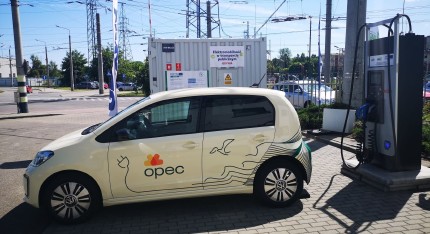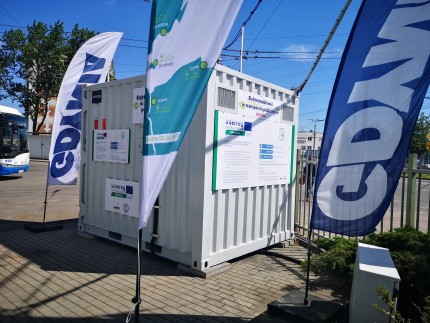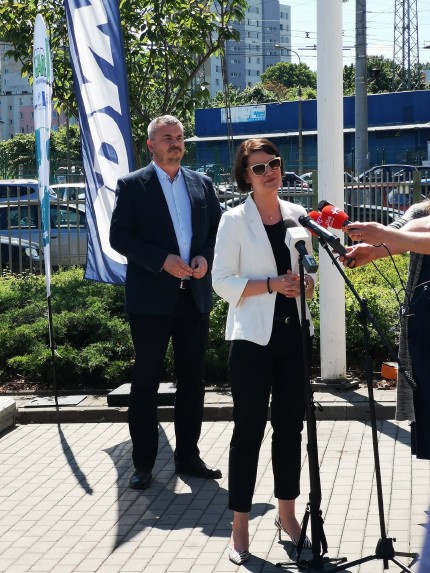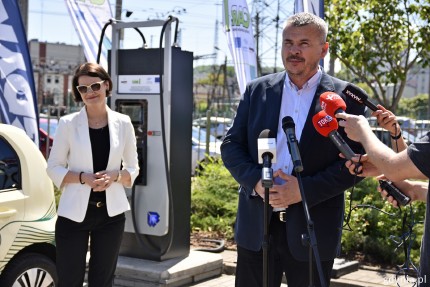In Gdynia you can charge a car thanks to trolleybuses
02.07.2021
The first mobile charging station for electric cars powered by a trolleybus network was built in Gdynia. It is a joint project of the City of Gdynia and the municipal trolleybus transport operator PKT. A press conference was held on the 9th June at the PKT headquarters about this unique mobile charger, which will use recovered energy from the braking of trolleybuses.
Gdynia is one of the three cities in Poland that use the advantages offered by trolleybus transport. Therefore, the city of Gdynia and PKT have completed two EU projects by implementing and testing an innovative solution, a mobile charging station for electric cars, powered by the trolleybus network.

Photo: Mobile charging station for electric cars powered by the trolleybus network (PKT)
- Today we are implementing a device for testing, which is not available for residents during the testing phase, but we hope that after it everyone will be able to use the service. It is quite an unusual device that allows for the installation of a mobile charger for electric vehicles. This kind of charger is not permanently connected to the ground and can be moved wherever we have a traction network, and uses energy that has been generated in the recuperation process - said Mrs. Katarzyna Gruszecka-Spychała, Vice Mayor of Gdynia for economy at the press conference.
An energy storage inverter has been designed and constructed by PKT within the EfficienCE project (Energy Efficience in Public Transport Infrastructure - INTERREG Central Europe), which is a device for processing excess braking energy and traction power. It allows for capturing excess energy generated by the braking of trolleybuses from the grid, and for the management of this energy. Interestingly, the inverter uses a used battery that will serve as an energy storage.

Photo: Energy inverter implemented within the INTERREG EfficienCE project (PKT)
On the other hand, a mobile charging station for electric cars was built as part of the project CAR (Creating Automotive Renewal – INTERREG South Baltic) by the city of Gdynia, allowing them to be charged with different ranges of power and electric current.
The synergy effect of the projects is a station that can be connected to the trolleybus traction network anywhere in the city. A prototype storage energy inverter with a connected mobile charger for electric cars was launched in June at the parking place of Gdynia trolleybus depot.
This investment has a huge advantage over the traditional solutions of mobile EV charging stations. Connecting the station does not require additional installation costs and shortens the investment time. There is no need to undergo a long formal process related to its construction, the connection conditions and commissioning the official launch of the station. Moreover, the advantage of the traction network is its extensive spatial range in many cities and thus its wide accessibility, that enables the charging station to be deployed where there is a problem of connecting to the AC power line, e.g. due to the need for construction works.
Time for tests
The scope and schedule of tests, prepared by specialists from PKT, will allow to check how the charging of electric cars affects the stability of the network, its parameters or the regular line operation of trolleybuses. The works will be carried out at different times of the days and night with varying intensity. Skoda Citigo-e, Opel Ampera-e and Nissan Leaf electric cars will be used in the tests. Depending on the needs, other electromobility users will be invited to assist. If the tests of the mobile charging station are successful, it will be possible to apply the solution on a larger scale.
- Gdynia has always been open and still is to electromobility. In this area, we are looking for innovative solutions, including those that we can share with others. Gdynia, like many other municipalities in Poland, is now participating in the process of creating a network of publicly accessible charging stations for electric cars. We selected the locations for the stations by taking into account the points of view of future charging station operators, as well as the needs of electric car users. The mobile e-car charging station is a pioneer solution on a national scale. In a short time and without the need to incur construction costs, we will be able to install the station wherever there is a trolleybus network and practically test the potential future chraging spots. After positive results, we will be able to offer the Gdynia idea to other cities, also including to those having a tram network - declared Vice Mayor Katarzyna Gruszecka-Spychała.

Photo: Vice Mayor Katarzyna Gruszecka-Spychała talked at the press conference about the importance of electrobomility (PKT)
Many aspects of one solution
The uniqueness of this solution also lies in the fact that the mobile charging station can be also connected to the tram network anywhere. Thus, a mobile charging station with an inverter will be a perfect solution for many cities with an extensive tram network. The implementation of both projects will make it viable for testing the model of linking individual and public transport on a larger scale, by leaving cars in buffer car parks connected to the city center by a trolleybus or tram network. Benefits? For example, coming back home by car charged with "green energy".
- This is a prototype and innovative undertaking that may be applied in areas where for energy feeding we can use available traction networks - trolleybus and tram grids, but also another energy from e.g. photovoltaic power plants. First of all, the inverter takes advantage of both otherwise lost green energy from recuperation, as well as of used batteries as energy storage. The use of the overhead line for charging e-cars opens up the potential for additional functions for the existing trolleybus network infrastructure. If the solution proves to be successful, the next step should be to assess the most relevant locations along the trolleybus network, where the energy recovery from braking system would be the highest - explained Mr. Tomasz Labuda, Vice President of PKT Management Board.

Photo: Mr. Tomasz Labuda, Vice President of PKT Management Board gave a speech on the press conference (PKT)
For this reason, the device is supplemented with an intelligent energy monitoring system, so it will be possible to control the level of energy consumption in the overhead line and detect the unused amount. The inverter has full electrical separation between the wired infrastructure and the powered electric car charging station, therefore the solution is completely safe.
Press release article authors:
- Marta Woronowicz – PKT GDYNIA
- Maurycy Rzeźniczak – City of Gdynia
- Paweł Kimel – City of Gdynia
